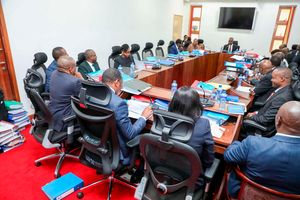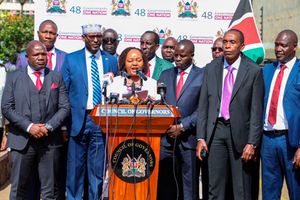
Controller of Budget Margaret Nyakang’o.
Governors are diverting billions of shillings approved to pay legitimate suppliers to other uses after withdrawing the money from official county accounts, ending up cancelling thousands of genuine payments.
Cancellations, which mostly occur towards end of the financial year in June, have also been blamed on Treasury delays to release funds, causing a mess that has seen pending bills rise by Sh25.8 billion last year alone.
The Auditor-General has revealed that in the year ending June last year, 15 counties cancelled 15,008 transactions valued at Sh13.26 billion.
A majority of the deals were cancelled after Treasury and the controller of budget (COB) approved the counties to pay contractors and suppliers who were scrutinised and proved to be legitimate. However, the COB was kept in the dark over the cancellations, the audit showed.
Kisumu county cancelled 4,127 transactions valued Sh2.67 billion, Kajiado cancelled 1,922 transactions valued Sh2.28 billion and Busia cancelled transactions valued Sh2.16 billion.
“Further, the voided payments had not been disclosed as pending accounts payables and utilisation of funds which were initially meant to pay the voided transactions was also not explained. In the circumstances, the funding may have been utilised to finance transactions that were not approved by the COB,” the Auditor-General revealed on Kajiado County.
The audit faulted the counties for keeping Treasury and the COB in the dark over cancellation of transactions.
COB Margaret Nyakang’o last Tuesday told Nation Africa that counties were diverting funds approved to pay suppliers, who had been scrutinised by her office, to settle the dues of companies whose claims have not been verified.
“Many of the pending bills are suppliers who have been listed for approval of their payments but after money is availed to counties and it gets to payment, the counties fail to pay them and make payments to different suppliers who had not been approved,” Dr Nyakang’o said.
The COB has previously flagged cases of counties voiding thousands of transactions after granting them approvals to pay, though her office is limited in terms of access to specific information.
The office also lacks access to transactions for which it has already granted approvals for counties to withdraw from county revenue funds (CRFs) and pay, which occurs after scrutinising their requisitions to establish legitimacy.
This prevents the COB from knowing if transactions she has approved are later cancelled.
“After I approve transactions I have no way of establishing if they have been voided, until when complaints emerge from suppliers later that some transactions which had been approved were not paid,” Dr Nyakang’o said.
Governors are the accounting officers in county governments and are responsible for financial operations of their counties.
In Busia County, the Auditor-General reported that more than a third of the Sh2.16 billion voided transactions were cancelled in June 2024, the last month of the financial year
“The highest voided transactions were in the month of June, 2024 amounting Sh772,602,862 or 36 per cent. No explanation was provided on why the payments were voided after being approved by the COB,” Ms Gathungu said.
In terms of counties with the highest numbers of cancelled transaction, Kisumu led with 4,127, followed by Nyandarua (3,125), Kajiado (1,922) and Siaya (1,500) — the four counties accounting for 71 per cent of all transactions cancelled by counties during the year.
Kisumu also led in terms of value of transactions cancelled (Sh2.67 billion), followed by Kajiado (Sh2.28 billion), Busia (Sh2.16 billion) and Bomet (Sh1.28 billion), summing to 63.3 per cent of all cancelled transactions.
The Nation reached out to 11 governors for an explanation on circumstances under which the payments were cancelled, but 10 of them had not responded by the time of publishing this article.
Embu Governor Cecily Mbarir, confirmed that her county cancelled 716 transactions valued Sh324.5 million after the National Treasury delayed disbursing funds, releasing Sh454 million that the county was waiting for in July 2024 after end of the fiscal year.
“Towards end of the financial year the county processes transactions that are due for payment as we wait for Treasury to release the money. When the money doesn’t come from Treasury, the county voids transactions and rolls them over to the subsequent year where they are included in the supplementary budget,” Ms Mbarire said.
The Embu Governor said that after Treasury delayed releasing money during the last fiscal year, the county kept the money until February this year when the transactions were formalised through its supplementary budget, and subsequently paid to approved suppliers and contractors.
She said by the time the county cancelled the transactions, the money had not been released and so it had not sought approvals from the COB to withdraw.
“The money never left the CRF (county revenue funds) because it wasn’t at the CRF at the time the transactions were voided. We had not got approvals from the COB,” she said.
Treasury Principal Secretary (PS) Chris Kiptoo termed voiding of transactions a “normal end of year procedure” after payments that had been processed fail to be settled by end of the year.
“Voiding of transactions after closure of financial year is a normal end of year closing procedure mostly for items that were processed in IFMIS (integrated financial management information system) but were not paid by closure of the financial year,” Mr Kiptoo said.
Treasury had promised to provide a comprehensive response to the Nation’s enquiries on circumstances under which the 15 counties cancelled over 15,000 transactions but had not by time of publishing.
While Mr Kiptoo appeared to normalise the trend as a usual occurrence, Ms Nyakang’o told the Nation that in order to counter the habit of counties diverting funds approved for specific payments to other uses, the Central Bank of Kenya (CBK) has developed a platform to centralise information on the IFMIS platform — where details on all public transactions sits. This will make the details visible to the CBK and the COB, as opposed to the current case where only Treasury has visibility.
Read: Why counties go broke
“The system was to kick-off on April 22, 2025 but Treasury has indicated that IFMIS is not ready yet. The CBK and COB are ready for this system and we are only waiting for Treasury,” Dr Nyakang’o said.
Under the new platform, Dr Nyakang’o said, public entities will be prevented from uploading transactions that are not planned for approval and payment to curb payments to suppliers who have not been scrutinized.
In the audit by Ms Gathungu, the big puzzle on the counties that cancelled transactions that had been approved by the National Treasury and the COB — the core oversight institutions — is how the counties ended up spending the money.












